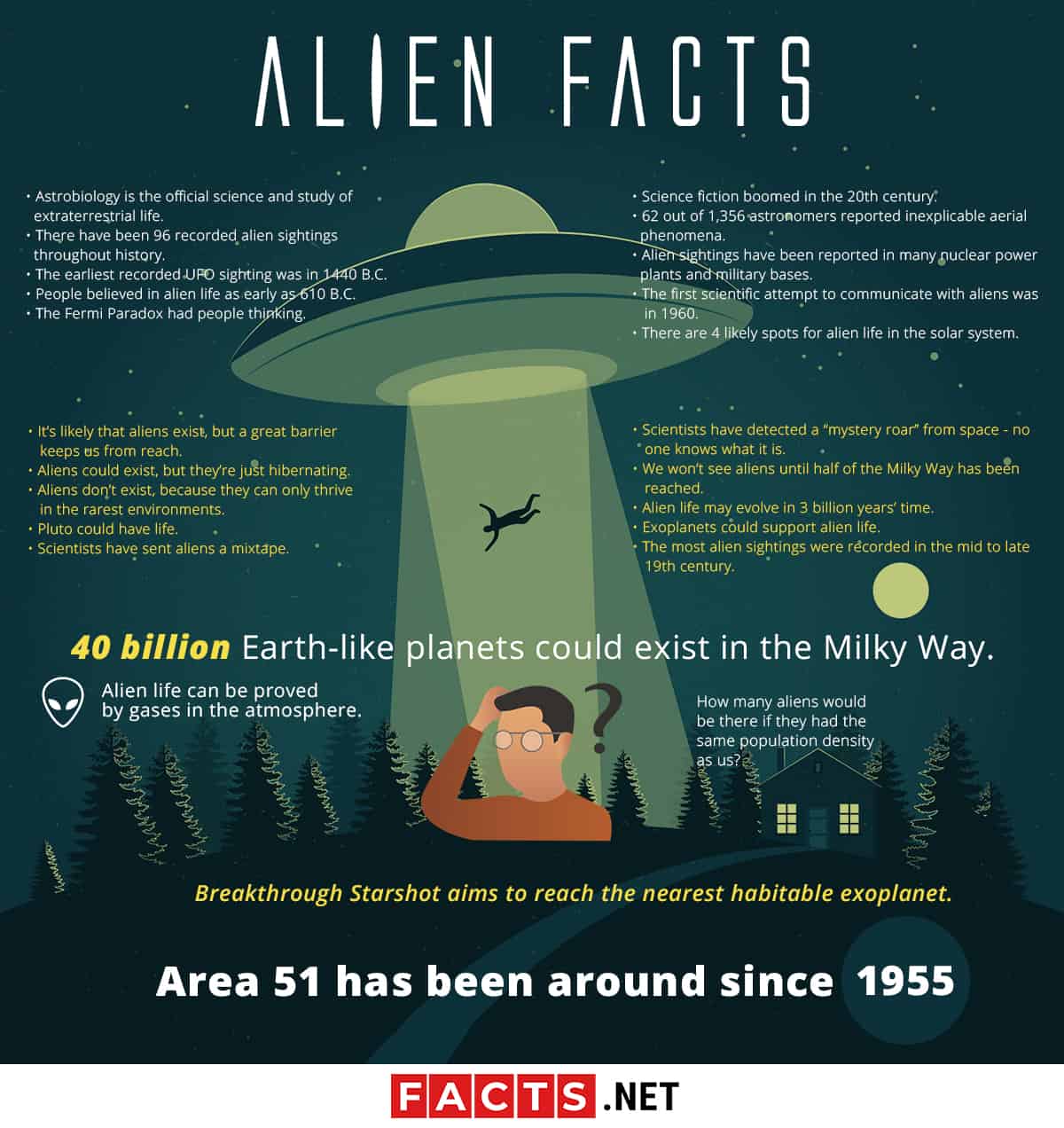
The question of whether we are alone in the universe has fueled centuries of curiosity and countless theories. From ancient sightings to advanced space missions, humans have long sought answers about alien life. Today, the search for extraterrestrial life combines scientific exploration with cultural fascination, bridging the gap between evidence and imagination. This article dives into 40 intriguing facts about aliens, covering scientific discoveries, historical sightings, and popular culture’s portrayal of these mysterious beings, offering a glimpse into humanity’s relentless pursuit of understanding life beyond Earth.
Alien Facts Infographics

General Concepts of Aliens
These foundational facts set the stage for understanding how we define and pursue knowledge about aliens.
- Definition: “Alien” generally refers to life forms from other planets or realms outside Earth.
- UFOs: The term “UFO” is tied to alien lore, symbolizing unidentified aerial phenomena linked to extraterrestrial theories.
- Extraterrestrial Life: Alien life could range from microbial forms to advanced, intelligent beings, according to scientific classifications.
- Astrobiology: Astrobiology studies conditions that could sustain life beyond Earth, focusing on environments that mimic those supportive of life on Earth.
Scientific Exploration
Scientists have pursued evidence of alien life through various space missions and advanced technology.
- Mars Exploration: NASA has deployed multiple rovers to Mars, searching for traces of past or present life.
- Icy Moons: Europa and Enceladus, moons of Jupiter and Saturn, are promising for alien life due to suspected subsurface oceans.
- Exoplanets: Thousands of exoplanets, some in habitable zones, hold potential for supporting life.
- Biosignatures: Certain atmospheric gases could serve as biosignatures, indicating biological activity and potentially life.
Theories and Hypotheses
Theorists have offered numerous hypotheses on the likelihood of extraterrestrial life and possible explanations for our lack of contact.
- Fermi Paradox: This concept questions why we haven’t encountered intelligent aliens, given the vastness of the universe.
- Panspermia Theory: This theory suggests that life on Earth might have originated from microorganisms carried by meteorites from other planets.
- Microbial Life: Microscopic life is the most likely alien form that scientists expect to find in space.
Cultural Impact
Alien life has a profound impact on culture, shaping perceptions and beliefs about the unknown.
- Science Fiction Influence: Aliens in films and books have shaped public perception, often as humanoid or dangerous beings.
- Alien Abduction Claims: Some report experiences of alien abductions, though these claims lack scientific support and are often explained by psychological factors.
Historical Context
Aliens have appeared in stories and observations across history, reflecting humanity’s long-standing curiosity.
- Early Sightings: Historical records suggest that ancient cultures observed unexplained aerial phenomena, often linked to aliens in modern interpretation.
- Project Blue Book: This U.S. Air Force program from 1952 to 1969 investigated UFO sightings, finding no proof of alien encounters.
Recent Developments
Modern efforts and renewed government attention highlight continued interest in alien phenomena.
- Government Investigations: The Pentagon’s Unidentified Aerial Phenomena (UAP) task force renewed official attention on UFOs.
- Public Interest: Media, documentaries, and news have fueled ongoing public fascination with aliens and UFOs.
Scientific Perspectives
Scientists bring a range of views and insights to the study of extraterrestrial life, influenced by scientific research and philosophical reflections.
- Carl Sagan’s View: Sagan famously suggested that if we are alone in the universe, it would be an incredible “waste of space.”
- Astrobiologists’ Research: By studying extreme Earth environments, astrobiologists gain insight into how life could survive on other planets.
Speculative Life Forms
Imagining alien life forms includes considering what adaptations might be needed to survive in extraterrestrial environments.
- Tardigrades in Space: Tardigrades, known for resilience, have survived space conditions, suggesting that life could endure harsh extraterrestrial environments.
- Potential Alien Biology: Scientists hypothesize that alien biology may differ vastly from Earth’s due to varying planetary conditions.
Notable Quotes
Philosophers, scientists, and thinkers have pondered the implications of extraterrestrial life.
- Arthur C. Clarke’s Words: “Two possibilities exist: either we are alone in the Universe or we are not. Both are equally terrifying,” highlighting the mystery of existence.
Current Scientific Consensus
Ongoing research has yet to produce definitive proof, but exploration continues.
- Lack of Evidence: Despite decades of study, no concrete evidence of alien life has surfaced.
- Continued Exploration: Space agencies persist in exploring Mars and other planets in search of life.
Public Engagement
The public engages with alien concepts through media, literature, and educational initiatives.
- Books on Aliens: Works like Aliens and Other Worlds explore extraterrestrial themes and foster public curiosity about space.
- Educational Programs: Various programs introduce people to astrobiology and extraterrestrial exploration.
Fun Facts About Aliens in Culture
Aliens have inspired countless stories, movies, and products, leaving a lasting imprint on pop culture.
- Iconic Movies: Films like Alien (1979) have influenced how aliens are depicted in popular media, blending horror and sci-fi.
- Alien Merchandise: The appeal of aliens has led to a wide array of merchandise, from toys to themed clothing.
Scientific Challenges
The search for aliens presents technological and scientific hurdles that limit our current understanding.
- Detection Limits: Current technology restricts our ability to detect distant life forms across the vast universe.
- Misinterpretation of Phenomena: Many UFO sightings are explained by natural or human-made causes rather than aliens.
The Search Continues
Efforts to discover extraterrestrial life continue, with various funding and interdisciplinary approaches advancing the field.
- Funding for Research: Both government and private entities fund research aimed at finding extraterrestrial life.
- Collaboration Across Disciplines: Astrobiology incorporates knowledge from biology, astronomy, geology, and chemistry, fostering new insights.
Future Prospects
Scientific and technological advancements may bring us closer to answers about extraterrestrial life.
- Technological Advances: Future innovations might improve our ability to detect biosignatures or analyze Martian samples.
- International Cooperation: Global partnerships enable data sharing and resource pooling, enhancing research outcomes in space exploration.
Unanswered Questions
Many questions about aliens remain, from their existence to the nature of possible contact.
- Existence of Intelligent Life: The likelihood of intelligent alien life is unknown, and scientists are divided on this issue.
- Contact Possibilities: Speculations vary on how, or if, humans might one day make contact with alien civilizations.
- Communication Challenges: Communicating across vast cosmic distances presents technical hurdles due to time delays and signal limitations.
- Ethics of Contact: Ethical considerations arise in contemplating how humans should respond to potential alien contact.
Cultural and Scientific Legacy
The search for aliens not only informs science but also enriches culture and reflects deep-seated human curiosity.
- Inspiring Scientific Inquiry: The quest to find aliens has motivated generations of scientists, leading to advancements in fields like astrophysics and biology.
- Ongoing Fascination: Whether through scientific pursuit or cultural storytelling, aliens continue to inspire imaginations, probing the boundaries of knowledge.
Was this page helpful?
Our commitment to delivering trustworthy and engaging content is at the heart of what we do. Each fact on our site is contributed by real users like you, bringing a wealth of diverse insights and information. To ensure the highest standards of accuracy and reliability, our dedicated editors meticulously review each submission. This process guarantees that the facts we share are not only fascinating but also credible. Trust in our commitment to quality and authenticity as you explore and learn with us.
